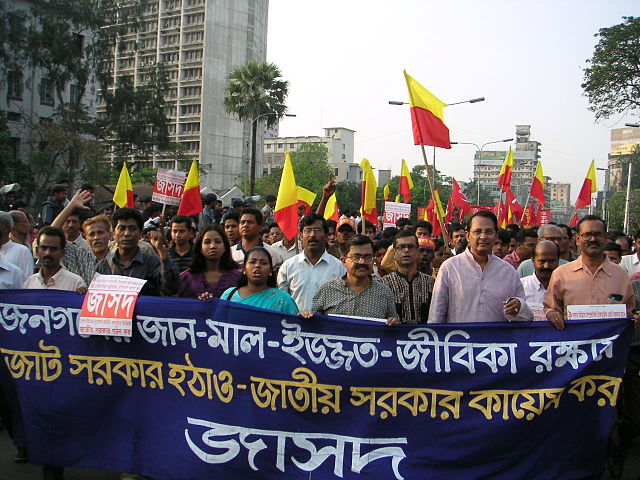Jatiya Samajtantrik Dal
Political party in Bangladesh From Wikipedia, the free encyclopedia
The Jatiya Samajtantrik Dal (Bengali: জাতীয় সমাজতান্ত্রিক দল, lit. 'National Socialist Party') is a political party in Bangladesh. The party was founded by Serajul Alam Khan. The party was dominant during the 1972–1975 Bangladesh insurgency. The current party president is Hasanul Haque Inu.[3]
Jatiya Samajtantrik Dal জাতীয় সমাজতান্ত্রিক দল | |
|---|---|
 | |
| Abbreviation | JSD JaSaD |
| Leader | Hasanul Haque Inu |
| Founder | Serajul Alam Khan Abu Taher Mohammad Abdul Jalil |
| Founded | 1972 October 31 |
| Split from | Chhatra League (Awami League) |
| Headquarters | 22/1 Topkhana Road (4th Floor), Dhaka[1] |
| Student wing | JaSaD Chhatra League |
| Armed wing | Gonobahini (1972–76) Biplobi Shainik Sangstha (1973–75) |
| Ideology | Democratic socialism[citation needed] Historical: Vanguardism Revolutionary socialism Scientific socialism[2] Left-wing nationalism |
| Political position | Left-wing[citation needed] |
| National affiliation | Grand Alliance |
| Colours | Red |
| Seats in the Jatiya Sangsad | Parliament dissolved |
| Councillor in City Corporations | Post dissolved |
| Chairmen in Subdistrict Councils | Post dissolved |
| Chairmen in Union Councils | Post dissolved |
| Party flag | |
 | |
History
Summarize
Perspective

The Jatiya Samajtantrik Dal (JSD) was formed on 31 October 1972[4] when it split from Bangladesh Chhatra League, the student wing of the Bangladesh Awami League, under the leadership of Serajul Alam Khan, M. A. Jalil, ASM Abdur Rab and Shajahan Siraj. It had an armed wing, Gonobahini, led by Colonel Abu Taher and Hasanul Haq Inu, Kazi Aref Ahmed, Monirul Islam, Sharif Nurul Ambia that led a violent left-wing insurgency against the regime of Sheikh Mujibur Rahman.[5] Their aim was to form a new left wing democratic national government, for facilitating establishing a socialist state with Bangladeshi characteristics. This led the government to use the pro-Mujib Jatiya Rakkhi Bahini (which consisted of die-hard loyalists to Mujib) to counter the insurgency by the Jatiya Samajtantrik Dal (JASAD) activists.[6]
Assassination of Sheikh Mujibur Rahman
Before the coup of 15 August 1975, Jatiya Samajtantrik Dal had planned to organize a mass upsurge to form a democratic national government replacing Sheikh Mujibur Rahman.[7]
After Sheikh Mujibur Rahman and his family were assassinated on 15 August 1975, Jatiya Samajtantrik Dal leader Abu Taher showed his support and remarked: "The corpse of Sheikh Mujib should have been thrown into The Bay of Bengal".[7] Hasanul Haq Inu was also seen reportedly dancing above an army tank after the incident.[citation needed]
On 7 November 1975, forces loyal to Colonel Abu Taher rescued army chief Ziaur Rahman from house arrest. When Ziaur Rahman realized that Abu Taher was moving the country into a direction of leftist communism, which contradicted Zia's right wing views, Zia declared martial law, formed the right wing Bangladesh Nationalist Party and cracked down on the Jatiya Samajtantrik Dal by executing Abu Taher and sentencing other leaders to various prison terms.[7][2]
Factions
During Ziaur Rahman's rule, Jatiya Samajtantrik Dal split up twice. The party fragmented again during the regime of Hussain Muhammad Ershad in the 1980s, with ASM Abdur Rab and Shajahan Siraj heading two separate factions. Abdur Rab's faction, Jatiya Samajtantrik Dal-JSD, became the opposition after taking part in the 1988 elections, that were boycotted by all major political parties. After the Bangladesh Nationalist Party (BNP) came to power in 1991, Jatiya Samajtantrik Dal allied itself with former rivals Bangladesh Awami League to counter growing BNP and right wing influence in the country. ASM Abdur Rab later served as a minister from 1996 to 2001 in the Awami League-led government.[2] After the BNP returned to power in 2001, Shajahan Siraj merged his party with it.[2]
Meanwhile, Inu, who became MP after winning elections as a grand alliance nominee with the victorious Awami League's boat as his symbol in 2008, was made Information Minister.[2] after another split, The general secretary of the Inu-led faction was Shirin Akhter.[8]
Election results
Jatiya Sangsad elections
| Election | Party Leader | Votes | % | Seats | +/- | Position | Government |
|---|---|---|---|---|---|---|---|
| 1973 | Serajul Alam Khan | 1,229,110 | 6.52% | 1 / 300 |
New | Opposition | |
| 1979 | 931,851 | 4.83% | 8 / 300 |
Opposition | |||
| 1991 | Hasanul Haque Inu | 171,011 | 0.50 | 0 / 300 |
Opposition | ||
| 2001 | 119,382 | 0.21 | 0 / 300 |
Opposition | |||
| 2008 | 506,605 | 0.72 | 3 / 300 |
Coalition Government | |||
| 2014 | 203,799 | 1.19 | 5 / 300 |
Coalition Government | |||
| 2018 | 610,044 | 0.72 | 2 / 300 |
Coalition Government | |||
| 2024 | xxxxxxx | xx.xx% | 1 / 300 |
Coalition Government |
See also
References
External links
Wikiwand - on
Seamless Wikipedia browsing. On steroids.
